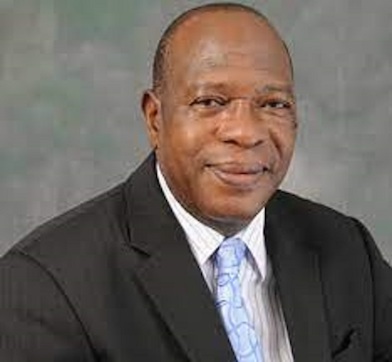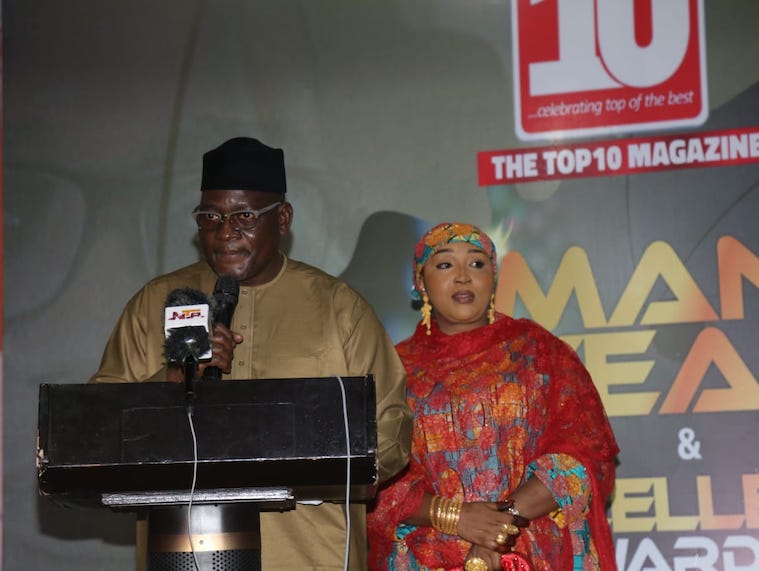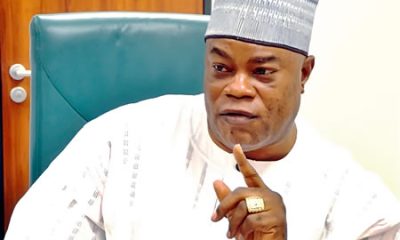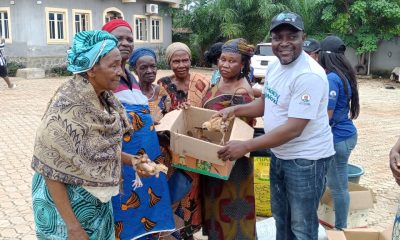Media
Funeral Oration for John Chiahemen

By Prof. Iyorwuese Hagher
My Lords Spiritual, the family of John Neji Chiahemen; Winnie Chiahemen, Children; Ide, Fanen, Mimi, and grandson Hemen. Tom Chiahemen his younger brother and the Nigerian Delegation; Senator Udo Udoma, Dr. Cletus Akwaya, Chief Tony Nnacheta, Prof.
Gerald Igyor, Colleagues at Reuters, Our In-Laws from Kenya, Gentlemen of the Media, Fellow mourners. Ladies and Gentlemen.I am Ambassador Iyorwuese Hagher, a classmate of John Neji Chiahemen. We were born and nurtured in the same ethnic environment of Tivland in Central Nigeria and were the last generation of those born under the British Colony of Nigeria. We were also the first generation of Nigerians with higher education to produce post-colonial manpower.
I wish to thank you all for the unique opportunity you have given, to pay the last respects to my friend. But I’m not here just to pay respect to my friend and compatriot. I am here to also honor Africa’s best journalist, a leading Pan Africanist, a humanist and our hero.
Neji was born in Tse Ikponko and his parents nurtured him on the vibrant Tiv story telling tradition. This nurturing became the seeds of media practice in his young mind. But it was at the Provincial Secondary School Katsina-Ala that Neji first acquired the tools of journalism, and went on to perfect his style and brand as a global media mogul.
Katsina-Ala Provincial Secondary school was a vastly diverse community of various tribes and races. It was here that Neji’s character was fully developed. Unlike many people who embrace careers and destinies through accidents or later in life, Neji grew from being a child storyteller to becoming a journalist while yet in Secondary School where he was on the editorial board of the school student Newspaper “The Ferry Point” edited by Mr. Isaac Yongo, who was a senior student. Even though I was at Bristow, a missionary secondary school, we met often, specially during the holidays.
Neji was a straight A student, and was known for starting a reading Club with his friends. They read hundreds of novels, excelled in debates, and were the most brilliant. The club was also, dubbed, the mischief club in Philips house. They engaged in pranks against their senior students and teachers. They resisted the school fagging system. He was very practical and hands on personality. When everybody complained about the poor school diet, Neji did not complain. He cultivated vegetables behind his hostel and grew tomatoes which he supplied to other students and mixed these in the rice. He called these tomatoes “cheese”.
Neji developed an independent mind and often went afoul of the military style- education foisted on them by a British retired army officer Clafton, the principal. This independence and resistant culture became a lifelong preoccupation to fight injustices in later life and to seek to expose them. Neji attended the All Girls Secondary School St. Louis Jos for his Higher School. He and
his classmates were the only males in the school. Neji was editor of the Lodestar School Newspaper. By attending an all-girls secondary school Neji assumed a comic and curious identity as an “old girl” of Saint Louis College. The alumni still refers to him as their late old girl alumnus. St. Louis taught the young Neji the significance of and respect for cultural, racial, ethnic and gender pluralism.
It was at Ahmadu Bello University that Neji and I became close friends. He had irrepressible charm. He exuded joy at all times. He had his nose in all happenings on campus and a breaking news mentality. He regaled us with witty, titillating and irreverent anecdotes about our hated professors. He was loyal and protective of his friends and favorite professors. He was master of words which he deployed strategically. Our campus life was intense but intellectually productive.
We joined the Anti-Apartheid movement and our heroes were Nelson Mandela, Martin Luther King Jr. Mohammed Ali, and Samora Machel. We clapped, danced with joy and mimicked the fiery rhetorics of Samora Machel when he came to receive an honorary doctorate degree at ABU in 1972. It was Aluta continua all the way. We embraced the global movement for the emancipation of the black race, and advocated for the decolonization of imagination and consciousness.
While on a long holiday in Jos Neji got his first professional job as a part-time reporter with the Standard Newspaper. The Newspaper was the protest voice of the minorities of Northern Nigeria. Neji and I never called each other by our names. Since I was older than him, I assumed senior brother status. He deferred to me and called me “Orvesen na jim jim”, Meaning my real leader and I in turn also called him by the same nickname “Orvesen na jim jim” my real leader, because he was an intellectual giant, a veritable encyclopedia with vast knowledge about everything.
After graduation I unsuccessfully tried to prevail on him to accept the academic position that was offered to him in the political science department of the university. He rejected the offer with hilarious contempt. “No Thanks. I would rather go out of the sheltered campus and see the world” he told me. And saw the World he did plentifully, traveling and working through the whole world, seeing the world and the world seeing him. I stayed back on campus to teach and research till I left and joined politics. He applauded me.
Neji encouraged me in my academic and literary writings and took two copies of all my published books for himself and Mimi his daughter. I remember the time I went to do research at the University of Nairobi. When Neji returned to Nairobi and found me at the Nairobi Hilton, he went to check me out of the hotel and took me to his home. I stayed with him and Winnie his newly married wife for the rest of my stay in Kenya. I was meeting Winnie for the first time. Winnie was then and now a beautiful, kind and generous soul. They were a perfect couple meant for each other. Neji made me see a beautiful Kenya through his eyes – a sprawling historical entity, diversely rich and struggling to overturn its internal contradictions- like most of post-colonial Africa.
A few months before his demise, he rushed to me his first major published book “One Market: the making of the inaugural Intra-African trade fair.”
In his endorsement of the book he wrote, “Orvesen na jim jim Exclusive copy of the book for Orvesen na” “Enjoy.” Neji I enjoyed your book. It is a masterpiece and a befitting parting gift
to your beloved Africa. It is a major legacy that summarizes your outlook and mission for Africa’s economic liberation from Neo-colonialism. You left us your vision of a united Africa, as a public intellectual and relentless crusader for global social justice. Your dream and belief in an Africa that could once again attain greatness through its drive to reverse engineer the continent, through integration and inter-regional trade, cannot die. It is an idea whose time has come.
Neji lived a beautiful life, a firmly planted life of serving others. He chose his vocation from childhood as a storyteller, and media practitioner par-excellence. Everywhere he went, he broke the news with zest. In his career at the Nigerian Television Authority, he dominated the news through innovation, energy, and uncommon insights. He was an uncommon man. He was a courageous Tiv man, and Pan Africanist, who sought to present the truth at all costs. Many times he put himself in harm’s way in search of reality and this truth. Everywhere in Africa where the leadership was unwilling to develop their countries Neji faced existential threats. But he was undaunted.
Neji attained greatness not just because he was the best in his profession, he attained greatness by the measure of courage, generosity, competence, humility, politeness, and the manner in which he treated everybody with respect. He pursued excellence in everything he did. He loved his friends and family and was very loyal to them. He was a trailblazer, and role model and lived the best of himself. I will miss those special days he breezed into Abuja and we sat alone and laughed at the foibles of the world. Our world.
Neji was totally devoid of jealousy, guile, and malice. He laughed at the world, and at circumstances he found himself in, even when he was treated unjustly by others who used their power of riches and influence. He never dwelt on injustices to himself. He never spoke bad of other people. I and many of John’s friends will miss him in diverse ways. All of his friends were special people to him. He was a celebrity who treated all of us also like celebrities. Life with Neji was to be enmeshed in affection and moral joy.
He defined his life with generosity and service. Neji, to paraphrase Helen Keller, “made the light in other peoples eyes his sun, the music in other’s ears his symphony and the smile on other lips his happiness.” He never trumpeted “who” he was but “whose” he was, and we knew he meant he belonged to us, family friends, Tivland, Nigeria and Africa!
My friend and brother Neji the Bible in Ecclesiasticles 3 vs 1. says “To everything, there is a season. A time for every purpose under the heavens” You fought a good fight. You deserve the crown of glory. It is time to say goodnight. God bless your soul till we meet again in heaven.
A Funeral Oration By Professor Iyorwuese Hagher, Nigeria’s Former Ambassador to Canada and Mexico at the Funeral of John Neji Chiahemen In Johannesburg, South Africa Sept.15, 2022
Media
Kogi Journalists Partner KGIRS On Tax Administration Enlightenment

From Joseph Amedu, Lokoja
Practicing Journalists in Kogi state have expressed readiness to partner with the State Internal Revenue Service on tax administration enlightenment and adequate publicity of its activities.
Chairman, Correspondents’ Chapel, Kogi State Council of the Nigeria Union of Journalists (NUJ) Segun Salami, gave the indication when he led his members on a visit to the Executive Chairman of KGIRS, Alhaji Salihu Sule Enehe.
Salami promised a robust collaboration with the agency in creation of public awareness on the need for all taxable citizens to embrace prompt payment of their personal income taxes.
“Our task as journalists is to assist the agency in meeting up with its target of revenue generation for Kogi government through our social responsibility duty of enlightening the people to key into regular and prompt payment of their taxes as when due
“Journalists also owe it as a duty to alert citizens on the need to contribute their quota towards the development of their state and the nation in general by meeting up with their financial commitment on prompt tax payment”
Salami advocated for quarterly media interaction with the agency as part of the partnership move in publicising its activities.
He commended the Executive Chairman and his management team for the resouding success so far recorded in generating more revenue for the state government to provide the needed democracy dividends to the people.
Responding, the Executive Chairman of the Kogi State Internal Revenue Service, Alhaji Salihu Sule Enehe, expressed delight over the prevailing cordial relationship between his angency and practicing Journalists in Kogi since assumption of office.
He promised to sustain the feat in the interest of both parties geared towards achieving accelerated transformation of Kogi.
Enehe also gave an assurance that he would live above board under the partnership agreement which according to him would go a long way in improving the agency’s services of mobilizing resources for the development of the state.
Media
Nami, Ex-FIRS Chairman Receives Top10 Magazine ‘Man of the Year 2023’ Award

Health
ICRC Trains 25 Journalists on First Aid Treatment in Yola

From Yagana Ali, Yola.
The International Committee of the Red Cross(ICRC) has organized a three -day training for 25 journalists on effective First Aid Treatment to prospective casualties.
The workshop, which took place in Yola drew the beneficiaries from different media houses across the state.
In a presentation, Communication Field Officer of the organization, Lemdi Edmond took the participants memory lane from its cradle to limelight.
He pointed out that ICRC intervenes basically in crises involving armed conflicts translating to man -made or unnatural disasters.
Edmond further explained that while the International Federation of the Red Cross intervenes in the area of natural disasters, like flood and earthquake, the National Red Cross Societies handles both natural and man – made situations.
The Communication Field Officer identified seven principles of the Committee to include humanity, impartiality,Neutrality and independence among others.
On their parts, First Aid and Pre-hospital Care Field Office Yola and Abuja respectively, Charity Maxwell and Daniel Ebodor jointly exposed the participants to the meaning, relevance and significance of the First Aid.
They maintained that First Aids basically aimed to save life, prevent condition from further deteriorating and promote speedy recovery.
They identified truthfulness, sympathy, resourcefulness, tolerance and empathy among others as qualities of a good First Aider.
The duo also enumerated and extensively explained Primary Survey variables relating to First Aid as Danger, Response, Airway, Breathing and chest compression.
Interestingly, the participants were vigorously engaged in practical First Aid treatment on various aspects having to do with Burns, Fainting, Fracture and bleeding among others.
Highlights of the training were questions and answers, presentation of certificate and First Aid Kits to the participants






















